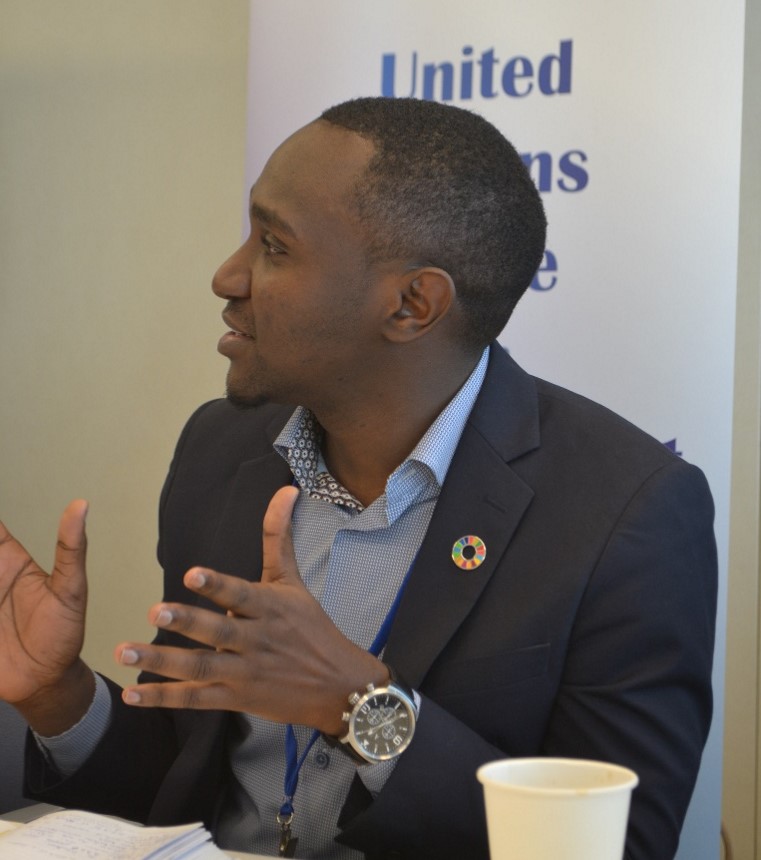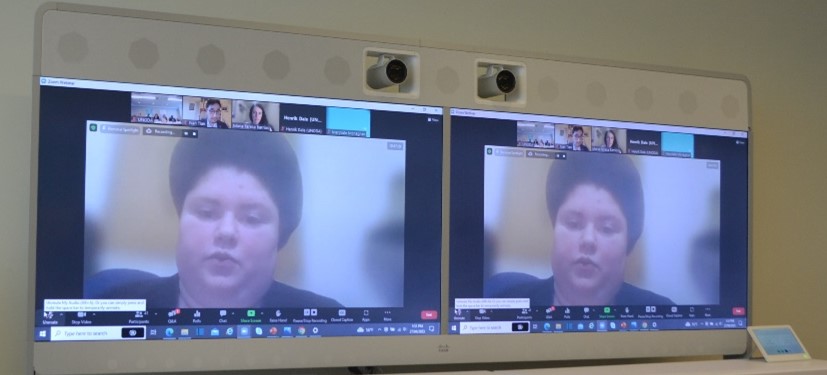News story
Youth, Member States, researchers and civil society discuss the relationship between disarmament and sustainable development

On 27 April 2023, the UN Office for Disarmament Affairs (UNODA) convened a panel comprised of UN Youth Champions for Disarmament, Member State representatives, researchers and civil society as part of its event entitled “Disarmament for Development: Rebalancing Military Expenditure with Development Priorities.”
The hybrid event, an official side event of the 2023 Youth Forum of the Economic and Social Council (ECOSOC), showcased the latest data on military expenditures, engaged young people on the topic of global military spending, and provided an opportunity to discuss the relationship between disarmament and sustainable development. The event also aimed to facilitate intergenerational and interdisciplinary alliance-building and identify practical ways in which young people can participate in the ongoing debate about rebalancing military spending.

The discussion was facilitated by Ms. Alexandra Marksteiner, Associate Political Affairs Officer at UNODA, and commenced with opening remarks by Mr. Ivor Fung, Chief of the Conventional Arms Branch at UNODA. Mr. Fung stressed the timely nature of the discussion; heightened instability and volatility around the globe is evidenced not only by rising levels of armed violence and the number of displaced persons, but also in the upward trend in military expenditures. He highlighted the value of the 2030 Agenda for Sustainable Development and the vital role of youth in implementing it. “We are convinced that young people can make significant contributions to disarmament, non-proliferation, and arms control processes and help promote change for a more peaceful and secure world”, Mr. Fung said.
Mr. Nan Tian, Senior Researcher at the Stockholm International Peace Research Institute (SIPRI), presented on the latest trends in global military spending. According to SIPRI, global military expenditures have been rising for eight consecutive years and reached a new record high of 2.2 trillion US dollars in 2022. Mr. Tian noted three factors that contributed to the rise in military spending, namely the Russian invasion of Ukraine, the reaction from Central and Western European countries thereto, and tensions in East Asia. On the upside, he noted that the economic burden of the military has decreased since the end of the Cold War.
Following this, the moderator asked the panel to reflect on the opportunity costs of rising military expenditures. Ambassador Lachezara Stoeva, Permanent Representative of Bulgaria to the UN and President of ECOSOC, noted that security is a requisite for the implementation of the Sustainable Development Goals. She explained the perspective of Bulgaria and the need to move from deterrence to defense in a situation when the threat became real. The Ambassador also mentioned that investing in a culture of peace is one way to ensure security.
Drawing on his experience growing up and working on the African continent, Mr. Patrick Karekezi, a UN Youth Champion for Disarmament under UNODA’s #Youth4Disarmament initiative, proclaimed that “peace cannot be achieved by acquiring or stocking arms”.

Ms. María Teresa Barrios, President of the Ibero-American Alliance for Peace, said that the rise of military spending contributes to the intensification and escalation of the conflict and that this can negatively impact the implementation of the Agenda for Sustainable Development. Ms. Barros also noted that governments must carefully consider the effects of expandingtheir military budgets.
Ms. Christelle Barakat, a UN Youth Champion for Disarmament, elaborated on the linkage between conflict and military expenditures and stated that “conflict makes it impossible to sustain development, as any structures that have been built can be destroyed in an instance.”

Discussing possible actions to encourage States to rebalance military expenditures, Ambassador Stoeva explained that security is a priority at the moment, and one of the ways to tackle rising military expenditures, isthe de-escalation of existing conflicts.
Commenting on how governments can ensure that funds are actually directed to sustainable development priorities, Mr. Tian emphasized that countries should have broadly defined security policies, addressing both military and non-military threats. Moreover, there must be internal oversight measures in place governing military budgeting process and allowing for input from civil society, so that resources are spent responsibly, he noted.
Patrick Karekezi and Christelle Barakat highlighted the importance of getting young people involved in disarmament. “More information about disarmament should be included in peace education and in school and non-school programs,” Ms. Barakat said.
Elaborating on the role of civil society in disarmament, María Teresa Barrios argued that disarmament should be the subject of study in formal and informal education. “We, as a community, should organize ourselves to foster the culture of peace.”
After the moderated discussion, the panel took questions from the audience. The speakers were asked about the role of young voices in Afghanistan, the reintegration of former child soldiers into society and “green” militaries. Mr. Fung spoke about the development of a New Agenda for Peace, where the role of young people is a particular focus. Besides that, the #Youth4Disarmament initiative continues to amplify the voice of young leaders. Talking about the reintegration of former child soldiers, Mr. Fung said that “it’s a shared burden” which requires the involvement of both former soldiers and society at large. Addressing the question of environmental responsibilities of the military, moderator Ms. Marksteiner explained that militaries are big sources of greenhouse gas emissions. However, undertaking additional efforts towards making militaries “greener” may require additional investment in the form of military spending, she noted.
The event concluded with a showing of the Spesterra Youth Challenge winner’s video by Ms. Virginia Bertuzzi. Ms. Soo Hyun Kim, Political Affairs Officer and #Youth4Disarmament initiative lead from the UNODA Regional Disarmament, Information and Outreach Branch, closed the event by delivering an inspiring plea for young people to join the global disarmament effort.
The recording of the event can be accessed here. Photos from the event can be found here.
Text by Olena Kryzhanivska. Images by Lisa Hamdaoui.